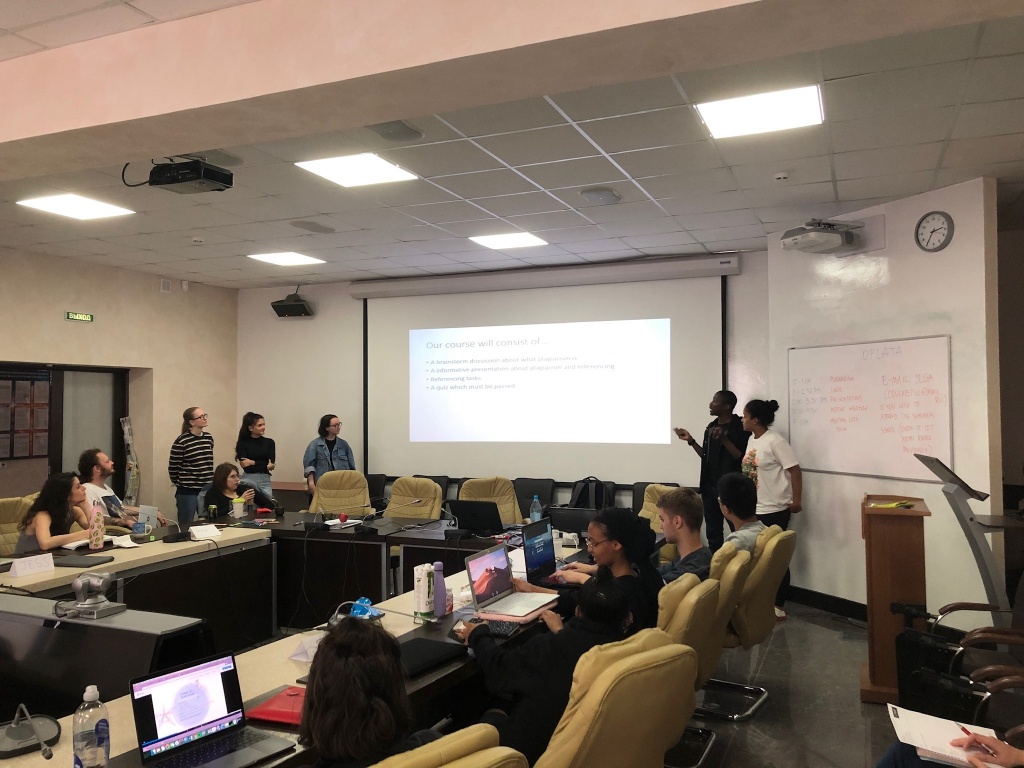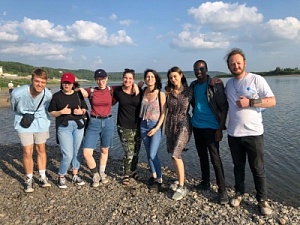An Erasmus+ grant for mobility between Goldsmiths and Tomsk State University (TSU) has enabled a large-scale exchange between the two institutions. The initiative is led by Goldsmiths academics, in collaboration with the International Centre for Research in Human Development (ICRHD) at TSU. The first 19 Goldsmiths undergraduate students were welcomed by TSU at the end of July, when they began their 2-month internship.
The visiting students are participating in a number of interdisciplinary and cross-cultural tracks, including cross-cultural psychology, early childhood development, and creativity and giftedness. Apart from research activities, students give sessions at local schools and share academic practice with students at TSU.
Students also participate in the projects of the Institute of Law and Ethics TSU (ILE) and The Accessible Genetics Consortium (TAGC) - exploring legal, ethical and societal implications of genetics (LESIG). For example, students will participate in the international conference Justice in the Genomic and Digital Era, organized by ICRHD and TAGC, with sessions by international experts in the areas of genetics, law, and technology. The conference will also include student activities as well as a networking session, where Goldsmiths students can interact with TSU students from Russia and other countries.
‘This is the first time that we have organized such a large-scale mobility between the two institutions.’ – comments Yulia Kovas, professor of Genetics and Psychology and director of InLab, Goldsmiths. ‘It is also the first time that the mobility is available not only for postgraduate students and staff, but also for undergraduate students. I am very happy that so many undergraduates showed interest and high motivation to participate in this program.’
‘Another exciting fact about this exchange is that it includes a new direction of collaboration between Goldsmiths and TSU – legal, ethical, and societal implications of genetic findings’ explains Fatos Selita, director of AIR Courses at Goldsmiths and ILE at TSU and the coordinator of LESIG working groups in Russia and the UK. ‘Addressing these implications is one of the most complex challenges for societies in developed economies. Such opportunities are invaluable for students’ development, and we thank the excellent team at the International Recruitment and Global Opportunities Team (IRGO), and particularly Eduardo Lees and Jack Selby, who have provided continuous support with the application and throughout. We also thank Teemu Toivainen, who has invested many hours for the last six months in preparing the students for the internship, including paperwork, inquiries, and meeting with students to discuss practicalities.’
‘This student mobility exchange is an extension of ongoing successful collaboration between TSU and Goldsmiths’ – adds Olga Bogdanova, associate professor at the Psychology Department and director of the Centre for Programme Evaluation and Knowledge Dissemination in Child Development at TSU. ‘The exchange program is designed and implemented at the International Centre for Research in Human Development to provide diverse academic learning opportunities in the interdisciplinary field of psychology. Students have an opportunity to gain experience with different research methods – for example, tutorials on R programming, EEG, and eye-tracking, to develop competencies in academic research and communication, and to gain cross-cultural knowledge and experience in intercultural communication. Students engage in individual and group work and interactive, project-based activities to strengthen academic and soft skills. At the end of the program, students will present the outcomes of their research and internship work, deliver teaching sessions for university and school students on a variety of topics, and discuss challenges, achievements, and goals for future academic progress. In addition to the extensive academic content, students have multiple opportunities for cultural learning. This exchange is a result of joint team work at TSU and Goldsmiths and we hope to learn a lot from this experience to advance our collaboration’.

Teemu Toivainen and Robert Chapman, PhD students at Goldsmiths and active members of InLab and TAGC, also visited TSU this month, conducting research and teaching as part of the Erasmus program. Teemu and Robert have been instrumental in coordinating the undergraduate mobility.
‘It is great to spend some time at Tomsk with such a great and active group of Goldsmiths students.’ – comments Teemu Toivainen. ‘Students have already been discussing their research interests and are excited to engage with ongoing projects at TSU. Some students have gone the extra mile and started already planning their second-year projects and third-year dissertations, some potentially collecting data for cross-cultural analyses while visiting TSU. I am looking forward to continuing this work with the students upon their arrival back to Goldsmiths.’
‘The students have settled into Tomsk really well’ – comments Robert Chapman. ‘They are engaging with some really interesting projects, including the development of plagiarism training material that will be used with Tomsk students. The ICRHD team has been kind enough to arrange molecular genetics and EEG workshops as the students were particularly interested in these. I’ve enjoyed teaching and discussing research ideas with the team at Tomsk and the students from Goldsmiths.’

The undergraduate students have also expressed some first impressions of TSU and Tomsk - a historical city, often referred to as Siberian Athens – home to several universities, including one of the best in Russia, Tomsk State University.
‘Tomsk is a nice city with so many lovely coffee shops.’
‘Everything is so cheap, I’m living like a king.’
‘Our hosts have been super-helpful – thank you Olga!’
‘The plagiarism and school project projects are great - it’s nice to do something that will be actually used.’
‘It was great to have open discussions and debate on genetics and creativity – this was something different from normal Goldsmiths seminars.’
A cultural program has been organized by the International Student Service Center, led by Lidia Zhuleva.
This mobility also supported by the Centre for Joint Academic Programmes of TSU.
We also thankful to the PARUS dormitory for comfortable accommodations and the U-NIVOL team of volunteers for follow-up.
This is the second Erasmus+ grant obtained by Goldsmiths for mobility between the two institutions, building on the success of the first 2-year exchange. The 2016-18 Goldsmiths-TSU Erasmus+ mobility has provided many opportunities for students and staff from both institutions. This year, 6 MSc students from TSU spent 3 months at Goldsmiths and 18 more MSc and PhD students and staff from TSU will come to Goldsmiths this autumn.

